Festivals - Fantasia 2021 : The last thing Mary saw: Let’s talk with Edoardo Vitaletti
By Mulder, New York, 13 august 2021
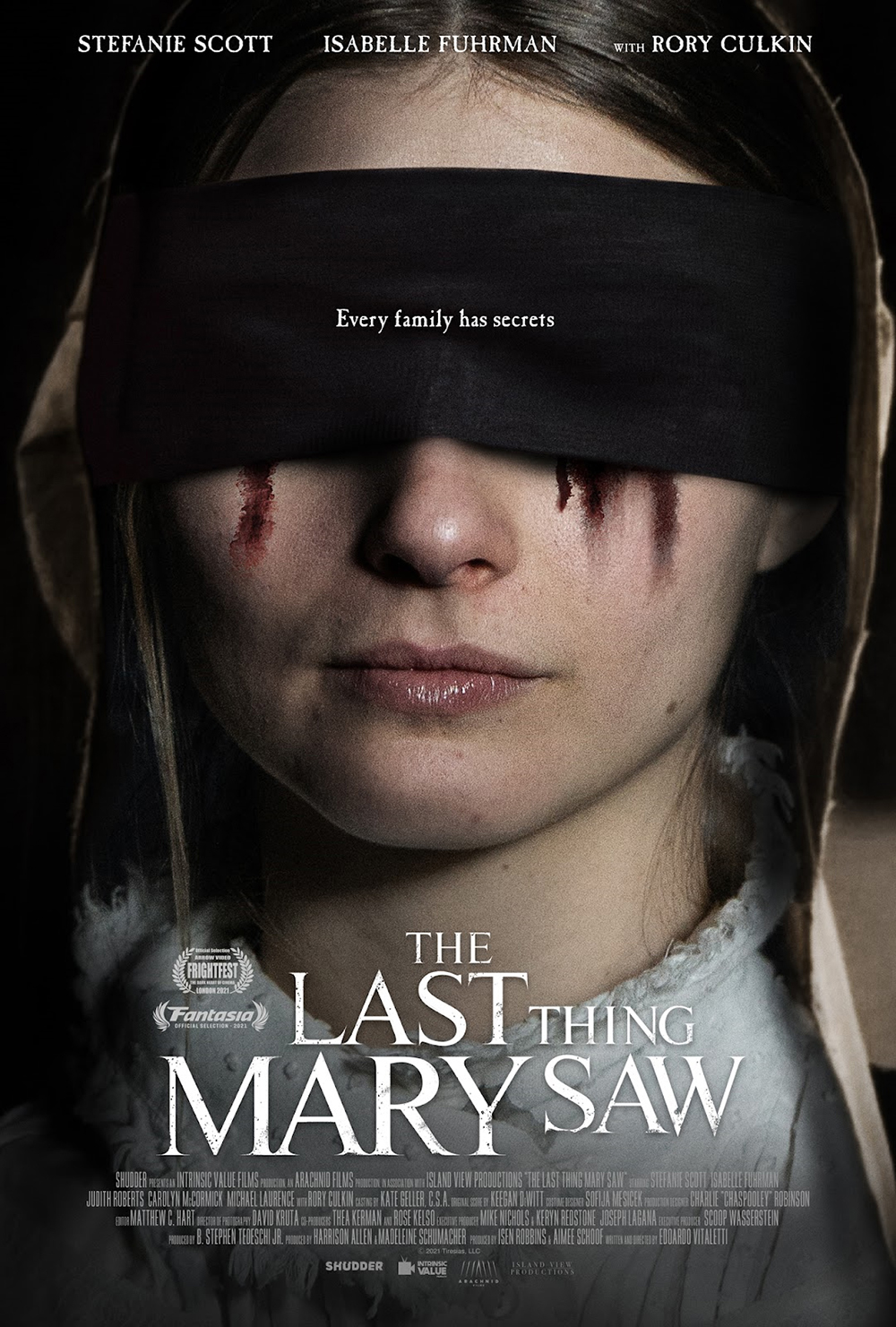
The Last Thing Mary Saw begins in Southold, New York, 1843: Young Mary (Stefanie Scott, Insidious: Chapter 3), blood trickling from behind the blindfold tied around her eyes, is interrogated about the events surrounding her grandmother’s death. As the story jumps back in time, we witness Mary, raised in a repressively religious household, finding fleeting happiness in the arms of Eleanor (Isabelle Fuhrman, Orphan), the home’s maid. Her family, who believe they are seeing, speaking, and acting on God’s behalf, view the girls’ relationship as an abomination, to be dealt with as severely as possible. The couple attempt to carry on in secret, but someone is always watching, or listening, and the wages of perceived sin threaten to become death, with the tension only heightened by the arrival of an enigmatic stranger (Rory Culkin, Waco, Halston) and the revelation of greater forces at work.
The Last Thing Mary Saw is produced by Isen Robbins and Aimee Schoof (Tesla, Blue Caprice) of Intrinsic Value Films, Harrison Allen and Madeleine Schumacher of Arachnid Films, Stephen Tedeschi (Blue Caprice) and Executive Produced by Scoop Wasserstein (The Outfit). The film had its world premiere virtually today as part of the 25th Fantasia International Film Festival, which kicked off August 5 as a hybrid event with in-person screenings in Montreal, Quebec and the virtual slate geo-locked to Canada. Following Fantasia, the film will have its UK premiere August 28 at FrightFest in London.
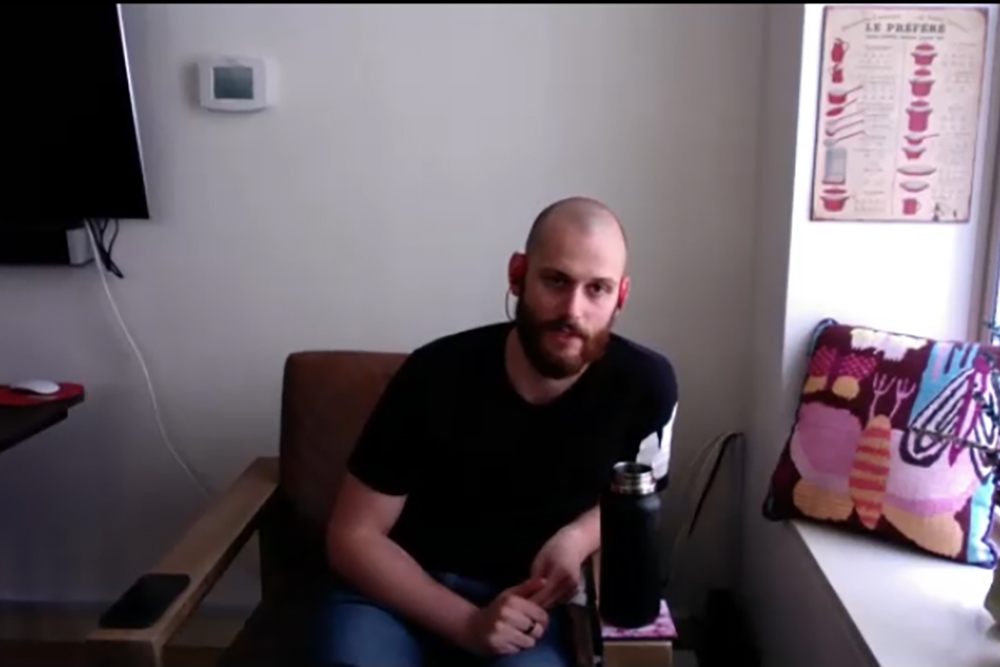
Q : Hello Edoardo, please can you introduce yourself and tell us a little bit about your background ?
Edoardo Vitaletti : yeah of course so my name is Eduardo Vitaletti. I'm originally from Italy. I was born in Milan and moved to New York about six years ago. I believe to attend college at NYU and so i did film school there and towards the end of my kind of film school career i began to make this movie The Last Thing Mary Saw which I wrote and directed after making a few shorts here and there and now The Last Thing We Saw is my first feature and my first real kind of directorial work. Now, i live in New York and that's me more or less perfect in a few words.
Q : In a few words, can you talk to about the story of your first feature film ?
Edoardo Vitaletti : Sure, The Last Thing Mary saw is a horror drama. It's a period horror drama based in 1843 in a rural New York area more specifically in south hold New York and it tells the story of young Mary a woman who has been raised in a repressively religious household um and was now under investigation after the kind of mysterious departure of her family's matriarch and then she starts to retell the story to the town's investigators. She sheds more light on her romantic relationship with the housemaid and on the sort of ageless forces that end up playing a role from within and without the household
Q : What were your main sources of inspiration, some movies, some books ?
Edoardo Vitaletti : Actually so the main sources of inspiration for this story i guess it all started from a lot of paintings I was studying and researching a lot into mostly 19th century Scandinavian visual art a lot of danish painters like Vilhelm Hammershøi a lot of fair island painters and there are a lot of representations of female subjects like alone in this kind of palatial 19th century Scandinavian houses as well as the representation of the funeral of funeral scenes like families with the families attending wakes and you know this very dark beautiful image of the morning and so that was kind of my entry point into story into like the visual that was like the visual inspiration and then that turned into a lot of research on the folklore of the time period 19th century sort of a Christian folklore and then of course like a lot of it kind of like my personal upbringing having been raised in Italy in a very like catholic environment you know i had a very open and beautiful family but a lot of the community around me like a lot of the contradictions of Christianity and Catholicism They kind of inspire the narrative of the story and the antagonistic forces present in the movie
Q : What Can you tell us about your filming locations ?
Edoardo Vitaletti : yeah so the movie was all pretty much shot in one location which is the main house where you see the family sort of isolated farmhouse that we found out on long island and it was like a like a pretty period appropriate kind of architecture and location because it was originally built in the 1700s and then there were several additions to it and so we ended up filming there everything more or less on location and it was you know of course it was quite challenging but what was really important to us was of course you know the kind of truthfulness of the the architectural kind of truthfulness of the time period and it made it really fun you know you have a lot of restrictions when you're shooting on location as opposed to soundstage um and uh being able to kind of embrace those limitations though made for you know like it kind of made its way into the narrative like in an interesting way.
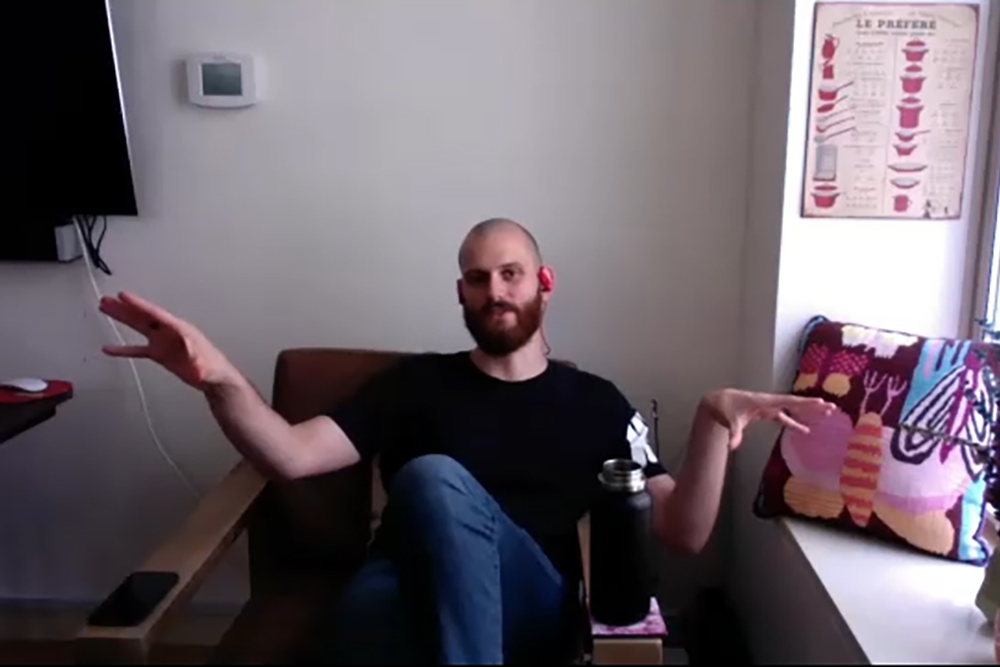
Q : What should be for you a good acting direction? What can you tell us about you work with Isabelle Fuhrman, Stefanie Scott and rory Culkin ?
Edoardo Vitaletti : i was really blessed with a with a great cast of course and you know when you when you work with people that caliber of the caliber it's really like it's very easy to direct them because it's also you know you can be very brave typically like we had a lot of conversations coming into the movie and before the set when i talked to them for the first time we did a lot of research together on the costuming the like the hairstyle body language dialect and an accent and you know when you so we all came into this piece already having a sense of the atmosphere and they delivered it very well and so when you're there on set you know the directions are typically very simple because we can all go back to those lengthier longer conversations that we were having before the shoot and so i mean just also people who have a lot of experience within the genre so they kind of knew a little bit what the gist was going to be as well but very curious performance too which is kind of nice when you're making a time period for them to be asking a lot of questions about like how should i speak what should my dialect be my accent.
Q : In this specific time, how is difficult actually to create a movie and find some funds to do it ?
Edoardo Vitaletti : Making movies has not gotten any easier over the past two years for sure and we were kind of lucky because you know we shot it right before the pandemic because we shot the movie in December 2019 but you know it's kind of a challenge i think at the same time though you know it's a little harder to like for someone to decide to make an investment on making a movie because they find that the kind of general economic climate is a little more tense of course and theaters are not very happy with the general revenue that they're getting from movies that can only come out in theaters and so that's kind of a big you know making a movie is always a big what if but now it's becoming an even bigger one and a bigger gamble at the same time though the interesting thing is i think we all collectively understood once and for all you know like the great the importance of the streaming platforms and of that like the access that um that streaming platform can give people to great content you know we're going to have our movie released through shutter in 2022 and we're extremely happy about that and i think that's that that part of you know that aspect of the of the film of the filmmaking industry like it it's a little it became much harder because the climate is so difficult but at the same time all these new sources of viewership increase the appetite so there was a nice kind of rebalancing there i'm personally very grateful of course i mean to Shudder specifically but to the just the kind of proliferation of streaming platforms because they just allowed so many more people to watch um to watch movies and they because they're so much hungry for content you know to some degree you have more places that you can potentially tap into to make a movie so it's harder to commit to a financial investment but you can ask more people and you have more potential sources which are for you is a good ingredient to create a good horror movie i actually think for me at least what was really important to me um you know it should always i think great horror movies are always about like they're more about the subtext than what you actually see on screen like you can make a horror movie that seems to be revolving a lot around you know like on killing torturing kind of you know like scary images nightmares.
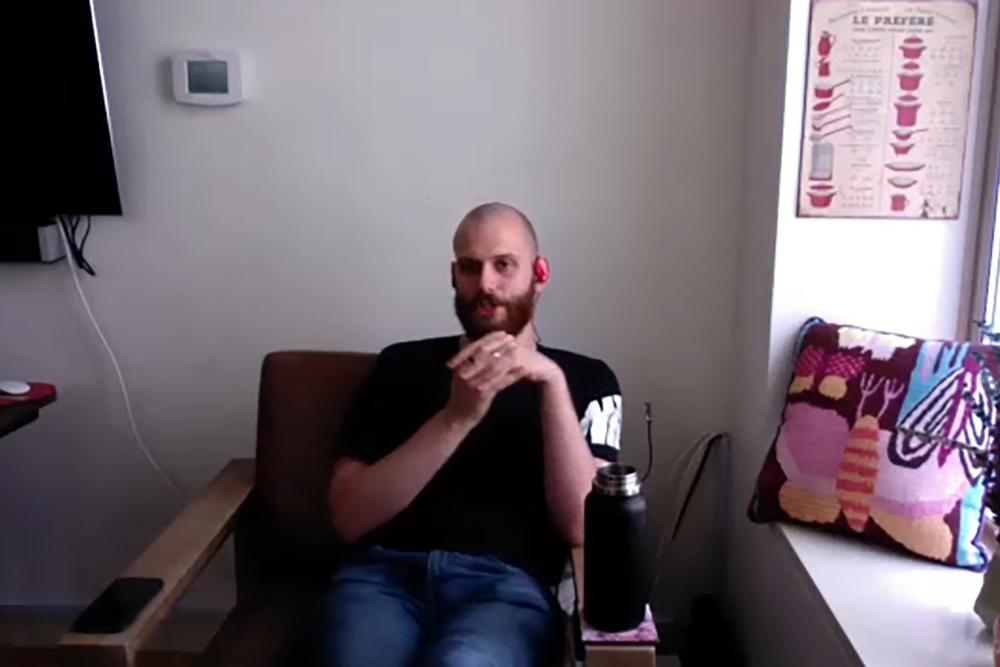
Q : Which are for you the good ingredients to create a good horror movie ?
Edoardo Vitaletti : The goal is to make all those things about something else you know it's like the horror and the killing and the revenge and the bloodshed like my movie for instance like the key kind of dramatic aspect of it is that it is a movie about wanting to be together it's a movie about togetherness and it's about oppression and it's about just wanting to be themselves for the main two actors so i think to me the key ingredient is always to find the real like why like why are you telling the story why do you want to say the things that you're saying and to not solely focus on the surface level kind of shock value of the imagery because i think a bloody image that doesn't mean much it feels very empty and the audiences have become you know they're so intuitive and i think we have become collectively a little bit better at understanding what movies do those things for shock value and what movies do that for because they're trying to convey a real experience so it should always be about something else than the like the shock itself.
Q : What was the most difficult scene for you to shoot and why ?
Edoardo Vitaletti : well definitely so the most difficult thing to shoot as far as my you know like the blocking and everything i think like the dinner scene towards the end which i'm not gonna say too much about but when people see it they will realize there's a lot of blocking and like a lot a lot of shots involved the room where we shot it was not very big we had a lot of performers about I think on that day we were working with you know like 13 15 actors at once and that was definitely one of the most challenging as well but i think oddly enough one of the most difficult things for a very practical reason we had to work with chickens a lot in the movie and i mean of all the animals of all the animals that you know like generally speaking it's really hard to work with animals of course because it's hard to direct something that's not that's kind of you know stop by listening to you but chicks are really difficult you know making them do what we you know doing the right thing at the right moment it was just uh we had to reshoot that quite a bit um i think we picked up a few close-ups after we were done shooting because it just didn't look quite right at first and it's that you know as much as the dinner scene for instance is very complicated and complex everything was under our control when you're dealing with animals it's just completely out of your control and you kind of have to be patient and wait and hopefully you know you're lucky enough that you get to do it so.
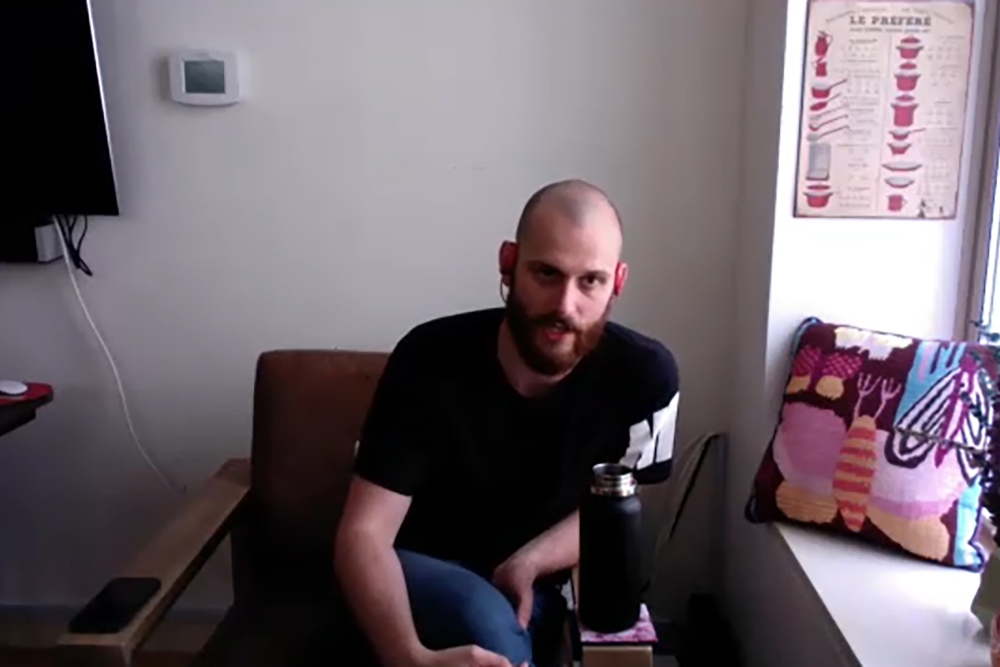
Q : What can you tell us about the fact that mainly your movie takes place in the darkness ?
Edoardo Vitaletti : I mean we wanted to not be fake about the portrayal of the time period and we wanted to force ourselves to have the same limitations that i wrote into the story for my characters so when the sun goes down in the you know in the 19th century uh you only have candles to see and you have to go outside if you have to use the bathroom and you have to do this and that so you know with the lighting we were very specific my dp and I, we wanted to use as many natural sources as possible so which was kind of challenging because of course when you're blocking an actor and you and you're only using a candle at night it's hard because when there's like slightly missing their mark maybe they're literally going out of light all at once and it's a little complicated but having that limitation once again it kind of informs like it the blocking informs the camera and the angles as far as i'm concerned so having those limitations for ourselves made the it added to the story and we wanted to be very specific like we didn't want to shoot something that where you could understand exactly that you know like two inches off screen there's a camera and there's a light stand and whatnot because of course when you're filming something that's set in the past it like the audience comes into the experience knowing that there is a like a patina of this is not really happening on your movie and the less the more that you can do to not take them out of the story the better and so all that darkness and all those candlelight scenes we wanted it to be with natural light we didn't fake it more or less at any point uh because it was important to keep the people in the story.
Q : What can you tell us about your collaboration with the composer Keegan DeWitt ?
Edoardo Vitaletti : i mean once again like i was incredibly lucky one of the people that I spend that i ended up spending the most time with during post production even though we were working remotely i mean he had such a good understanding of the story and of the type of approach that i wanted to have on this movie like i was talking about before how the key ingredient to make a great horror movie for me is to always make it about something else like to find your deep like the y that's at the core of you wanting to tell the story he understands that so well and he understood that so well like yes the movie is dark it's uh there are moments of violence or moments of fear scare anxiety but he understood that at its core it is a movie that you know it revolves around the story of two people wanting to be together it is a movie that revolves around oppression and so forth and so every scene every time you would compose something like a lot of times you see horror movies that work very well tonally where you know like high strings and it's unnerving and scary and that's all good and great but there isn't much character to it there isn't too much personality to it and one thing that Keegan and i always talked about was let's not just make the sort of tonal thing it's dark scary it's unnerving let's reach for the character let's bring up that subtext let's really remind ourselves in the audience all the time why we're telling the story and he understood that very well so it was a great collaboration
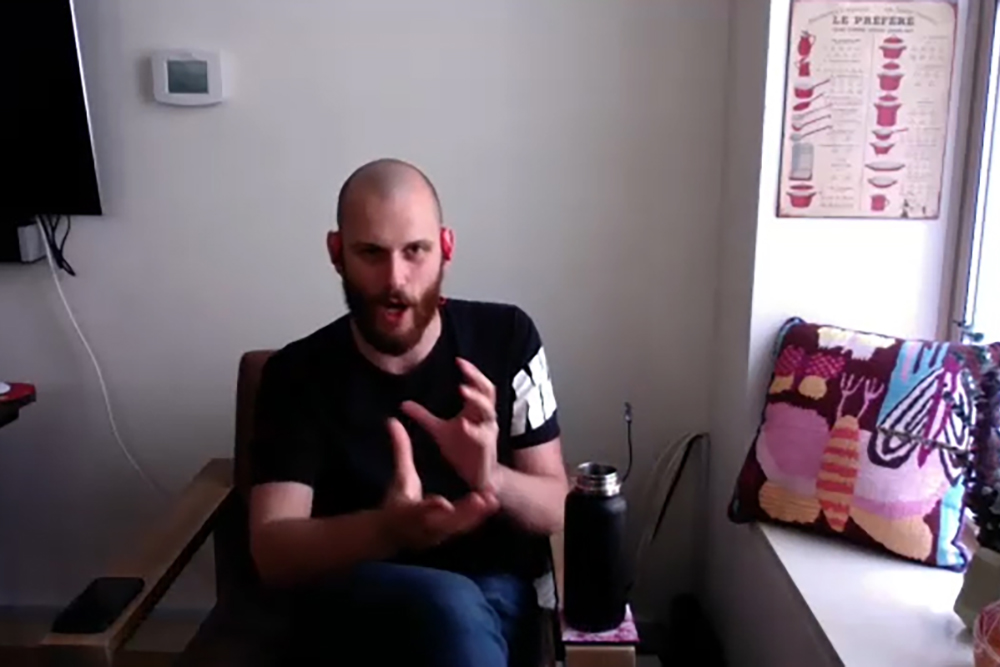
Q : The last thing Mary saw will have its premiere this Sunday during the Fantasia Festival and also will be shown in the Frighfest festival. Wednesday we have learn the Shudder has acquired the right of this for North America, the United Kingdom, Ireland, Australia and New Zealand. What are your feelings about that ?
Edoardo Vitaletti : Incredibly excited you know we've been making this movie for a couple of years and it's super and super exciting to have it watched by audiences you know whether it's virtual fantasia the sunday or at Frightfest in London and august 28th i think we have our first in-person screening of the movie and then yeah i mean like I couldn't have asked for a better partner than Shudder in releasing this movie and you know like they know what great genre storytelling is and i'm just very pleased that they looked at our movie and took notice and thought that we were kind of a worthy addition to their slate and so just the fact that even more people are going to be able to see it in 2022 on their platform super exciting i feel very honored.
Q : What did you learn and retain from making this film?
Edoardo Vitaletti : i mean i've learned i've learned a lot of things a lot of painful lessons a lot of beautiful lessons um i think you know i've been asked that question a lot and over the past few days i've realized really like the one thing that always stands out to me is like some great advice. My cinematographer gave me during the production it's something really important because it has a very practical effect and outcome on the shooting of the movie but you know I was very stressed because we were going really fast and the shoot was really intense and then somewhere halfway through it halfway through it uh he gave me this kind of tip to never forget to have fun with it and to find some lightness and liberty in the process no matter how fast you're going no matter how dark the story is and i think the movie just immediately like the shoot and the movie became so much better after that and i think the big lesson is to remember the like the joy of filmmaking is going to trickle into the product it's going to have an effect on it's going to color the final type of the movie so uh that's the biggest thing i think that i learned as the most like kind of that's the thing that i remember the most i think from the shoot as far as like the pleasant things that i've learned.
Q : Which are your currents projects ?
Edoardo Vitaletti : so you'll probably see me operate in a similar field soon enough we have been working on another script that's kind of still it's in the genre space it may not be a horror movie but still you know like period piece folklore and hopefully we will be able to kind of talk more in detail soon but yeah there is definitely something in the works and you know in a similar vein.
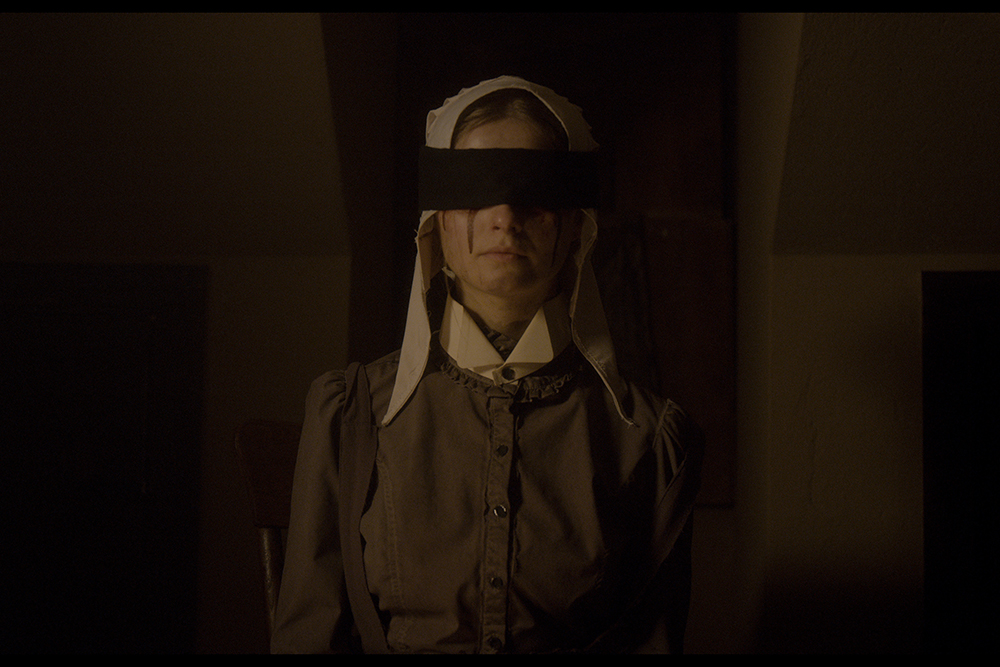
Synopsis :
Winter of 1843. A young woman is investigated following the mysterious death of her family's matriarch. Her recollection of the events casts new light on the ageless forces behind the tragedy.
The last thing Mary saw
Written and directed by Edoardo Vitaletti
Starring Rory Culkin, Isabelle Fuhrman, Judith Roberts, Stefanie Scott
Music by Keegan DeWitt
Cinematography :David Kruta
Edited by Matthew C. Hart
Release date : August 15, 2021 (Fantasia), January 20, 2022 (France)
Running time : 89 minutes
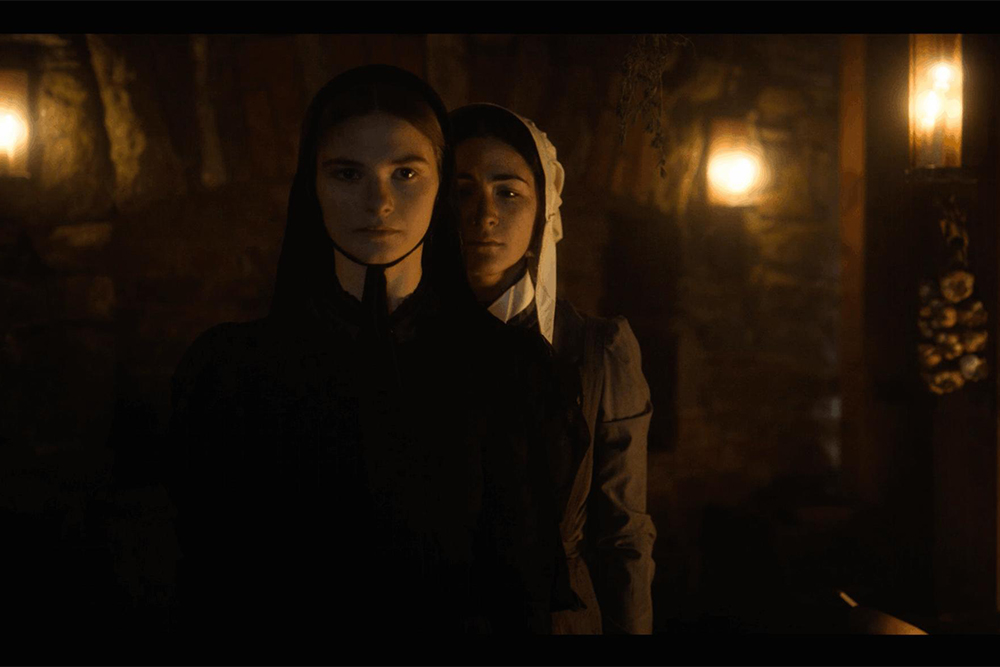
We would like to thanks Edoardo Vitaletti for this great interview.

